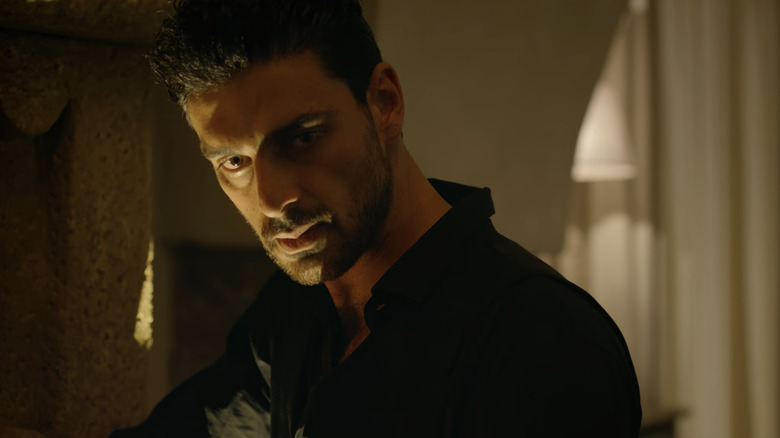The Netflix Trilogy That IMDb Users Consider One Of The Worst Of All Time
We may receive a commission on purchases made from links.
Netflix has been the undisputed winner of the streaming wars for some time, with more than 300 million subscribers around the world. To put that into perspective, the platform's next biggest rival is Prime Video, which has 200 million subscribers, many of whom may have signed up primarily for the delivery perks rather than the streaming offerings. To be sure, Netflix has managed to claim the crown by offering an impressive array of programming and often delivers some of the best media available. For example, "Adolescence" might have been one of the best Netflix originals ever, proving that in 2025, the streamer was more than capable of giving a platform to thoughtful, serious creatives with something to say.
But you don't become the biggest streamer in the world by appealing solely to those looking for a more cerebral viewing experience. As such, Netflix is also home to what I think it's fair to say are the quintessential examples of "streaming slop" — the kind of "content" that actually makes you happy to think that Joe Russo's AI-driven garbage future will soon arrive, if only because it means human beings won't have to make this stuff any more.
Perhaps you think that's unfair. Indeed, as the aforementioned "Adolescence" proves, Netflix is not simply a cleverly marketed ploy to eliminate human creativity from the entertainment industry. The company's efforts to expose global audiences to media from outside their native countries are also commendable. Subscribers might otherwise have been robbed of the chance of seeing Oscar-nominated Spanish survival drama "Society of the Snow," for example. But then, there's stuff like the "365 Days" trilogy, a Polish series of films that's so bad every single one of them is in the IMDb bottom 100 films list.
365 Days was a controversial hit for Netflix
The fact that Netflix is a global company often results in some pleasant surprises on the streamer's most-watched charts. In 2023, for example, Indian crime drama "Jaane Jaan" topped the Netflix charts, proving once again that the streamer was a force for good, at least in terms of exposing audiences to films and series that they otherwise might never encounter. In 2020, however, subscribers were greeted by a new erotic thriller from Poland sitting in the "Recently Added" category that seemed designed to undo all that goodwill Netflix had built up with its other international offerings.
"365 Days" or "365 dni" is based on the first in a series of three novels by Polish author Blanka Lipińska, and had been given a theatrical release in its native country in February 2020 before hitting Netflix in June of that year. In yet another example of how streaming has taken over the world, the film's streaming debut was a much bigger deal than its theatrical run, as "365 Days" became a big hit with global audiences. But its notoriety was also propelled by the controversy surrounding its streaming release, most of which was down to its depiction of a toxic relationship between young Warsaw woman Laura Biel (Anna-Maria Sieklucka) and Sicilian mob boss Massimo (Michele Morrone), which began with the latter imprisoning the former for 365 days.
The film wasn't just a hit. It was verging on a phenomenon, with "365 Days" debuting at No. 1 worldwide on the streamer and breaking multiple viewing records. All of this while it was being criticized for seemingly celebrating the concepts of rape and kidnapping as if they were simply scenarios to be mined for erotic thrills. Unsurprisingly, critics were unimpressed, to say the least. The movie has a 0% rating on Rotten Tomatoes, with Jessica Kiang of Variety describing it as "thoroughly terrible, politically objectionable, occasionally hilarious." Meanwhile, the Razzies nominated "365 Days" for worst movie of the year (though it's surely long since been time to retire the Razzies altogether).
All of which should have been enough to ensure any sequel plans were scrapped. But with viewing figures like that, Netflix was never going to say no to more, and this time the company was going to spearhead the whole sordid affair, producing two more movies that went straight to the streamer and which skipped theaters altogether. "365 Days: This Day" arrived on Netflix in April 2022, and the threequel, "The Next 365 Days," debuted in August that same year. More abject reviews and controversy ensued, but perhaps the trilogy's most impressive achievement is landing every single one of its installments in the IMDb bottom 100.
The 365 Days trilogy turned bad movies into an art form
When "365 Days: This Day" arrived, critics once again derided its unhealthy portrayal of romantic relationships, even while many acknowledged the filmmakers had tried to tone down the sexual violence. Or, to put it another way, as Variety's Jessica Kiang wrote, the sequel was "piping hot trash," and not much more could be said for "The Next 365 Days." Every film currently sits at 0% on Rotten Tomatoes (John Travolta and his seven 0-percenters would be proud), and every film is in the lowest-rated films list on IMDb.
The highest rating any of the movies could manage was just 3.3 stars based on 105,000 ratings. That dismal honor goes to the first movie, which represents a high-water mark for the trilogy, with both follow-ups slipping in the rankings. The third film, "The Next 365 Days," earned just 2.9 stars based on 12,000 ratings, while the second, "365 Days: This Day," was the lowest-rated, with 2.7 stars based on 27,000 ratings.
That's an achievement of a sort, though it's hardly helping Netflix dodge accusations of making a mockery of movies and filmmaking — a criticism that's only become more widespread in recent years. In fairness, Netflix shouldn't shoulder all the blame for this one, as the "365 Days" trilogy was clearly influenced by the worldwide popularity of the "50 Shades" franchise. What's more, viewers around the world apparently watched these movies until they slipped into a streaming-induced coma if the viewing figures are anything to go by, so Netflix can simply claim to be giving viewers what they want. Somehow, though, that doesn't make any of this feel any better.


